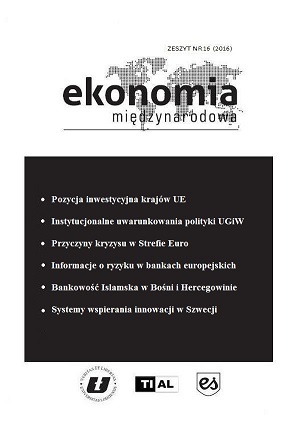O przyczynach kryzysu w strefie euro
DOI:
https://doi.org/10.18778/2082-4440.16.03Słowa kluczowe:
strefa euro, kryzys finansowy, bilans płatniczyAbstrakt
Celem artykułu jest przedstawienie przyczyn kryzysu finansowego w strefie euro w podziale na dwie ich kategorie: przyczyny bezpośrednie i fundamentalne. W odniesieniu do pierwszej z nich saldo rachunku obrotów bieżących powinno być postrzegane jako kluczowa determinanta dynamiki PKB w strefie euro w latach 2008–2012. Z kolei najważniejszymi czynnikami fundamentalnymi okazały się te, które były związane ze strukturą rynku i jakością infrastruktury instytucjonalnej.
Bibliografia
Amel D., Barnes C., Panetta F., Salleo C. (2004), Consolidation and Efficiency in the Financial Sector: A Review of the International Evidence, “Journal of Banking and Finance”, No. 28, 2493–2519.
Google Scholar
Berger A.N., Mester L.J. (1997), Inside the box: What explains differences in the efficiencies of financial institutions?, “Journal of Banking and Finance”, No. 21, 895–947.
Google Scholar
Boltho A., Carlin W. (2012), The problems of European monetary union – asymmetric shocks or asymmetric behaviour?, VoxEU.org, 31.03.2012 (date of access: 20.10.2013).
Google Scholar
Caballero R., Fahri E., Gourinchas P.O. (2008), An Equilibrium Model of “Global Imbalances” and Low Interest Rates, “American Economic Review”, 98 (1), 358–393.
Google Scholar
DOI: https://doi.org/10.1257/aer.98.1.358
Carroll C., Jeanne O. (2009), A Tractable Model of Precautionary Reserves, Net Foreign Assets, or Sovereign Wealth Funds, NBER Working Paper 15228, Cambridge, MA.
Google Scholar
DOI: https://doi.org/10.3386/w15228
Chen R., Milesi-Ferretti G.M., Tressel T. (2012), External Imbalances in the Euro Area, International Monetary Fund Working Paper 12/236, Washington, DC.
Google Scholar
DOI: https://doi.org/10.5089/9781475524673.001
Demirguc-Kunt A., Huizinga H. (2010), Are Banks Too Big to Fail or Too Big to Save? International Evidence from Equity Prices and CDS Spreads, European Banking Center Discussion Paper 2010–59, Tilburg.
Google Scholar
DOI: https://doi.org/10.1596/1813-9450-5360
Fatas A. (2013), The Euro counterfactual, Antonio Fatas on the Global Economy, http://fatasmihov.blogspot.com/2013/09/the-euro-counterfactual.html (date of access: 16.12.2016)
Google Scholar
Ferreira C. (2012), Bank market concentration and efficiency in the European Union: a panel Granger causality approach, School of Economics and Management (Technical University of Lisbon) – Department of Economics Working Paper 03/2012/DE/UECE, Lisbon.
Google Scholar
Goldstein M., Veron N. (2011), Too Big to Fail: The Transatlantic Debate, Peterson Institute for International Economics Working Paper 11–12, Washington, DC.
Google Scholar
DOI: https://doi.org/10.2139/ssrn.1746982
Reis R. (2013), The Portuguese Slump and Crash and the Euro Crisis, Brookings Papers on Economic Activity, spring 2013, Washington, DC.
Google Scholar
DOI: https://doi.org/10.3386/w19288
Serven L., Nguyen H. (2010), Global Imbalances Before and After the Global Crisis, World Bank Policy Research Working Paper 5354, Washington, DC.
Google Scholar
DOI: https://doi.org/10.1596/1813-9450-5354
Shambaugh J. (2012), The Euro’s Three Crises, Brookings Papers on Economic Activity, spring 2012, Washington, DC.
Google Scholar
DOI: https://doi.org/10.1353/eca.2012.0006
Pobrania
Opublikowane
Jak cytować
Numer
Dział
Licencja

Utwór dostępny jest na licencji Creative Commons Uznanie autorstwa – Użycie niekomercyjne – Bez utworów zależnych 4.0 Międzynarodowe.









